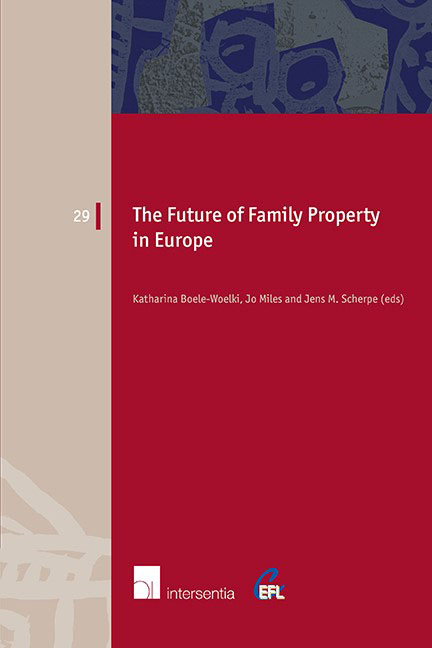Book contents
- Frontmatter
- Preface
- Contents
- List of authors
- PART ONE KEYNOTE LECTURE
- PART TWO MATRIMONIAL PROPERTY LAW IN EU ROPE
- PART THREE FAMILY CONTRACTS – ISSUES OF AUTONOMY
- PART FOUR PROTECTION OF OLDER PEOPLE IN LAW
- PART FIVE FREEDOM OF TESTATION AND PROTECTION OF FAMILY MEMBERS
- PART SIX CHILD MAINTENANCE
- PART SEVEN UNIFICATION OF PRIVATE INTERNATIONAL FAMILY LAW
- PART EIGHT CLOSING REMARKS
Testamentary Freedom and Caring Adult Offspring in England & Wales and Ireland
Published online by Cambridge University Press: 08 May 2020
- Frontmatter
- Preface
- Contents
- List of authors
- PART ONE KEYNOTE LECTURE
- PART TWO MATRIMONIAL PROPERTY LAW IN EU ROPE
- PART THREE FAMILY CONTRACTS – ISSUES OF AUTONOMY
- PART FOUR PROTECTION OF OLDER PEOPLE IN LAW
- PART FIVE FREEDOM OF TESTATION AND PROTECTION OF FAMILY MEMBERS
- PART SIX CHILD MAINTENANCE
- PART SEVEN UNIFICATION OF PRIVATE INTERNATIONAL FAMILY LAW
- PART EIGHT CLOSING REMARKS
Summary
INTRODUCTION
The default rule in English succession law is that ‘an Englishman still remains at liberty at his death to dispose of his own property in whatever way he pleases’. Nevertheless, family provision legislation has made significant incursions into that principle in England and Wales, as well as its equivalent in other common law jurisdictions. Under such family provision statutes, certain family members and dependants may apply for discretionary financial provision out of a deceased person's estate where the deceased's will and/or the default intestacy rules have failed to make suitable provision for the applicant.
This chapter concerns family provision claims made in two European jurisdictions, namely England and Wales and the Republic of Ireland, by adult offspring who have provided care for their now-deceased parents. The ageing population in Europe is highly relevant to this question in two respects. First, it may cast doubt on the purposes of family provision law and succession law in general, since people are less likely to be in financial need by the time their parents die. Secondly, the fact that the population is ageing increases the longterm care needs present among the general population, and raises the question of whether and how the state should encourage informal care provided by family members, including offspring.
The chapter begins by discussing the purposes of succession law and considering the extent to which succession law can and should be used to reward, support or encourage informal care. After summarising succession law in England and Wales and the Republic of Ireland, the chapter then considers the relevance of care to family provision claims made by adult offspring in those jurisdictions. The chapter concludes by assessing the need for and likelihood of reform in those jurisdictions to increase the relevance of care to such claims.
THE PURPOSES OF SUCCESSION LAW
This section explores the purposes of succession law and assesses the extent to which it can and should be used to support, reward or encourage care provided by family members. Peart summarises the accepted purposes of succession law as:
… consider[ing] the wishes of the individual … the preservation and security of the family, and … [protecting] the welfare of society in general by promoting the equalization of fortunes.
- Type
- Chapter
- Information
- The Future of Family Property in Europe , pp. 251 - 276Publisher: IntersentiaPrint publication year: 2011
- 17
- Cited by

